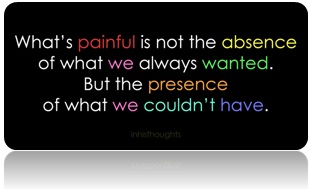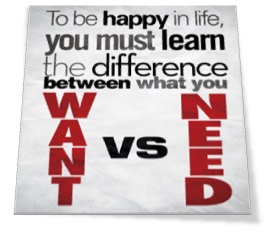A Coaching Power Tool Created by Grace Kong
(Leadership and Executive Coach, CANADA)
 In a world where there are so many options and so many influences it is easy for one to fall prey to things that one wants over what one really needs. A world where choices are abundance, making decisions on a daily basis have become difficult at times. Nowadays choices such as deciding which television show to watch over the many during one free hour of time or trying to make a decision on what career direction to take are not as simple as it was in comparison to 15 to 20 years ago.
In a world where there are so many options and so many influences it is easy for one to fall prey to things that one wants over what one really needs. A world where choices are abundance, making decisions on a daily basis have become difficult at times. Nowadays choices such as deciding which television show to watch over the many during one free hour of time or trying to make a decision on what career direction to take are not as simple as it was in comparison to 15 to 20 years ago.
So how do you decide? Do you lean towards a desire based on what you “want”, for perhaps the fulfillment or gratification of satisfying personal happiness or do you decide based on a true “need” to meet the essential necessity in gratifying a personal requirement? Well the decision often depends on the circumstance and what you are hoping the overall outcome would be.
Defining “Need”?
Often times in a typical day we usually blurt out the words “I need…something…”, does the statement that follows address the real need at hand or does the need truly help you achieve something greater. Firstly, let’s first define the word “Need”:
need: noun \ˈnēd\ A motivating force that compels action for its satisfaction. Needs range from basic survival needs (common to all human beings) satisfied by necessities, to cultural, intellectual, and social needs (varying from place to place and age group to age group) satisfied by necessaries. [1]
In essence a “need” addresses the concept of meeting life’s necessities. It may be as simple as meeting the fundamental requirements for you to live, including food, drink, safety, shelter and/or clothing, etc.. As psychologist Abraham H. Maslow’s “Hierarchy of Need’s Theory” suggests, people are motivated to fulfill basic needs before moving on to other, more advanced needs, such as friendship, relationships, self-esteem, confidence and/or achievements, etc..[2] So if that is the case, could you live a satisfied life by only meeting your basic needs? Or would life without advanced elements of need, such things as love, family, friendship, confidence and beliefs & values result in a meaningless life? If these greater elements of needs are required, then could these advanced elements of needs, evolve into “wants”?
Defining “Wants”?
So what is construed as a “want”? Is it truly the desire to achieve a more advanced level of “needs”? Or is it a desire for something that you currently don’t have? By definition “want” is defined as:
want: verb \ wänt,wônt \ To have a desire to possess or do (something); wish for. A lack or be short of something desirable or essential.[3]
Basically, it is a desire for something that you would like to have but by not having it wouldn’t stop you from living. It is usually things that you can live without, potentially associated with life’s indulgences or figuratively nice things to have, to make enhance your life. For example, wanting to raise your self-image and your self-esteem may lean you towards purchasing a fancy car to drive may not only increases these elements but it also make you feel great, attract more friends, raise your self-image and subsequently adding to the quality of life, but without it, you wouldn’t likely suffer in anyway.
Putting it into Perspective
In reflection of the definitions, making a choice of needing something over wanting something may be daunting at times. On a daily basis it is easy for many of us to blurt out a phrase “I want this/that/to…”. It is less frequent that phrases begin with “I need this/that/to…”. However, do we stop and think about what we are truly saying or how we phrase what we aspire for? Putting it into perspective, for those that live in a society where standards of living are high, many of our decisions lie on the lifestyle we choose to live. The image of living a lifestyle where others influence contributes greatly on how you chose the things you chose on a day-to-day basis, become the norm as your decisions tend to revolve around the expectations of the lifestyle you have chosen. For example, the concept of “Keeping up with the Joneses” is an idiom where parts of the developed countries around the world uses this analogy whereby they compare a benchmarked neighbor as a reference to their own social economic stature. Failure to “Keep up with the Joneses”, may in fact demonstrate that his/her own social stature may be at an inferior level.
In spite of this perception, on the reverse, in undeveloped societies that are less fortunate, Keeping up with the Joneses or satisfying a life with luxurious things to maintain a certain lifestyle may be completely foreign, let alone even a choice. For example, in a well-developed society not having access to the internet in your home, your work or a nearby coffee shop may seem uncommon or possibly strange. Resulting in the heighten desire of wanting access to the internet soon becomes an arduous task and adventure to seek it out. If you step back and think about it, does the desire to want accesses to the internet so badly, turn this want into a need? It is interesting that when you reflect upon that desire to immediately acquire access to the internet, do you ever stop to question yourself “do I really need the internet that badly or could I live without it”? Many don’t think of it that way. But many outside of the developed societies don’t even value this as they don’t even know what the internet is. To put it simply into perspective, only approximately 40% of the world has access to the internet.[4]
On the contrary, how often do you think about needing a clean glass of water to drink or clean water to bathe with? Over approximately 780 million people around the world live without clean drinking water[5], most individuals in developed countries don’t even think about access to clean water as it is so accessible that many take it for granted. Although these elements may be extreme in comparison to each other, it is merely just to put it into perspective that depends on the society in which you live and the lifestyle you choose have, expectations of what is needed and what you want may differ greatly.
Evaluating What is Important
In a society where simple necessities are met, in most cases “wants” become more of the norm. A lifestyle in a developed society may effect decisions in many cases due to influences, as they play a big part in you achieving a type of lifestyle that you wish to aspire to. A lifestyle influenced by media, friends/neighbors, perception, social media and social economic status, soon take over on how you really make your decisions, rather than taking the time to stop to evaluate the true value of what you really need over what you wish to have.
It is not suggesting that to achieve your goals in life you need to live a life of simplicity, it is merely noting that you need to recognize that there is a balance between those things that are important for you to have in your life over things that you would like to have based on what you can achieve, and in some cases possibly personally and financially afford. Consider from a personal perspective trying to achieve and/or satisfy a want may have impact to your personal lifestyle including your health or your family. As an example taking on an additional, two or three jobs just to earn enough money to afford the expensive car that you want; working so many hours and not having enough time to rest may have an overall impact to your health, let alone financially to afford the car. And dependent on how badly you may want something the desire to have it, evolves over time and become so overbearing that it no longer is a want but soon crosses over to become a need or a necessity. And without it, it potentially over takes how you live and behave that it effects you so greatly, it hinders you from living a comfortably and happy life.
 Prioritizing The Value of A Decision
Prioritizing The Value of A Decision
Contemplating a decision, may not be simple. Taking the time to evaluate and prioritize the value of a decision by weighing what is truly important to you, can impact how a decision is determined. Prioritizing well could essentially have greater impact to your overall life and/or lifestyle. Not being able to prioritize, begs to question whether or not the decision required, is truly important. Decisions especially significant ones should be based upon how the outcome could improve, impact or affect your life. Making the right decision could really enhance your overall well begin, effectiveness as a person and achieve an overall greater outcome and/or potential life.
Coaching Application
When working with clients in trying to guide them through achieving his/her goal, assess with them how much they want or need to achieve their goal? Have them assess the true value of achieving their goal in comparison of not achieving it. Identify if the goal which they are trying to achieve is a want (ie desire/luxury) or a need (ie. necessity). Inquire if he/she was successful at achieving his/her goal, how would it improve, impact or affect their life and/or happiness? If they can articulate that their overall result could have an impact to their life, then help coach them through their journey. Once they achieve it, acknowledge them for their efforts and accomplishments.
Reflection
- When trying to make a decision what would be the easiest decision to make?
- When making a decision whether it is something you want or a decision that meets a personal necessity. What decision will have the most impact?
- What you want, is it a true priority and if it is how would it affect your life if you had it?
- What do you truly need?
[1]
[2] http://psychology.about.com/od/theoriesofpersonality/a/hierarchyneeds.htm
[3] https://www.google.ca/?gws_rd=ssl#q=want+definition
[4] http://www.internetlivestats.com/internet-users/
[5]
